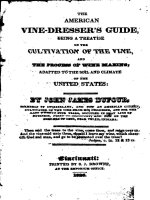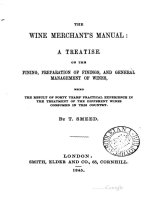Project Gutenberg’s A Treatise on Probability, by John Maynard Keynes pdf
Bạn đang xem bản rút gọn của tài liệu. Xem và tải ngay bản đầy đủ của tài liệu tại đây (2.34 MB, 561 trang )
Project Gutenberg’s A Treatise on Probability, by John Maynard Keynes
This eBook is for the use of anyone anywhere at no cost and with
almost no restrictions whatsoever. You may copy it, give it away or
re-use it under the terms of the Project Gutenberg License included
with this eBook or online at www.gutenberg.org
Title: A Treatise on Probability
Author: John Maynard Keynes
Release Date: May 31, 2010 [EBook #32625]
Language: English
Character set encoding: ISO-8859-1
*** START OF THIS PROJECT GUTENBERG EBOOK A TREATISE ON PROBABILITY ***
Produced by Andrew D. Hwang, Ralph Janke, and the Online
Distributed Proofreading Team at (This
file was produced from images generously made available
by The Internet Archive)
transcriber’s note
Minor typographical corrections and presentational changes
have been made without comment. Typographical corrections
and regularizations of hyphenation are documented in the
L
A
T
E
Xsource file.
PDF bookmarks are provided for navigation to individual
sections.
This PDF file is formatted for screen viewing, but may be easily
formatted for printing. Please consult the preamble of the
L
A
T
E
X source file for instructions.
BY THE SAME AUTHOR
INDIAN CURRENCY AND FINANCE
8vo. Pp. viii + 263. 1913.
7s. 6d. net.
THE ECONOMIC CONSEQUENCES
OF THE PEACE
8vo. Pp. vii + 279. 1919.
8s. 6d. net.
A TREATISE ON PROBABILITY
MACMILLAN AND CO., Limited
LONDON · BOMBAY · CALCUTTA · MADRAS
MELBOURNE
THE MACMILLAN COMPANY
NEW YORK · BOSTON · CHICAGO
DALLAS · SAN FRANCISCO
THE MACMILLAN CO. OF CANADA, Ltd.
TORONTO
A TREATISE
ON PROBABILITY
BY
JOHN MAYNARD KEYNES
FELLOW OF KING’S COLLEGE, CAMBRIDGE
MACMILLAN AND CO., LIMITED
ST. MARTIN’S STREET, LONDON
PREFACE
The subject matter of this book was first broached in the brain
of Leibniz, who, in the dissertation, written in his twenty-third year,
on the mode of electing the kings of Poland, conceived of Probability
as a branch of Logic. A few years before, “un problème,” in the
words of Poisson, “proposé à un austère janséniste par un homme du
monde, a été l’origine du calcul des probabilitiés.” In the intervening
centuries the algebraical exercises, in which the Chevalier de la Méré
interested Pascal, have so far predominated in the learned world over
the profounder enquiries of the philosopher into those processes of
human faculty which, by determining reasonable preference, guide our
choice, that Probability is oftener reckoned with Mathematics than
with Logic. There is much here, therefore, which is novel and, being
novel, unsifted, inaccurate, or deficient. I propound my systematic
conception of this subject for criticism and enlargement at the hand
of others, doubtful whether I myself am likely to get much further,
by waiting longer, with a work, which, beginning as a Fellowship
Dissertation, and interrupted by the war, has already extended over
many years.
It may be perceived that I have been much influenced by W. E.
Johnson, G. E. Moore, and Bertrand Russell, that is to say by
Cambridge, which, with great debts to the writers of Continental
Europe, yet continues in direct succession the English tradition of
Locke and Berkeley and Hume, of Mill and Sidgwick, who, in spite of
their divergences of doctrine, are united in a preference for what is
matter of fact, and have conceived their subject as a branch rather of
science than of the creative imagination, prose writers, hoping to be
understood.
J. M. KEYNES.
King’s College, Cambridge,
May 1, 1920.
v
CONTENTS
PART I
fundamental ideas
CHAPTER I
page
The Meaning of Probability . . . . . . . . . . . . . . . . . . . . . . . . 2
CHAPTER II
Probability in Relation to the Theory of Knowledge 9
CHAPTER III
The Measurement of Probabilities . . . . . . . . . . . . . . . . . . 20
CHAPTER IV
The Principle of Indifference. . . . . . . . . . . . . . . . . . . . . . 44
CHAPTER V
Other Methods of Determining Probabilities . . . . . . . . . 71
vi
CONTENTS vii
CHAPTER VI
page
The Weight of Arguments . . . . . . . . . . . . . . . . . . . . . . . . 78
CHAPTER VII
Historical Retrospect . . . . . . . . . . . . . . . . . . . . . . . . . . . . . . 87
CHAPTER VIII
The Frequency Theory of Probability . . . . . . . . . . . . . 102
CHAPTER IX
The Constructive Theory of Part I. Summarized . . . . 123
PART II
fundamental theorems
CHAPTER X
Introductory . . . . . . . . . . . . . . . . . . . . . . . . . . . . . . . . . . . . . 126
CHAPTER XI
The Theory of Groups, with special reference to
Logical Consistence, Inference, and Logical Pri-
ority . . . . . . . . . . . . . . . . . . . . . . . . . . . . . . . . . . . . . . . . . . . . . 135
CHAPTER XII
The Definitions and Axioms of Inference and Proba-
bility . . . . . . . . . . . . . . . . . . . . . . . . . . . . . . . . . . . . . . . . . . 146
A TREATISE ON PROBABILITY viii
CHAPTER XIII
page
The Fundamental Theorems of Necessary Inference . 153
CHAPTER XIV
The Fundamental Theorems of Probable Inference . . 161
CHAPTER XV
Numerical Measurement and Approximation of Prob-
abilities . . . . . . . . . . . . . . . . . . . . . . . . . . . . . . . . . . . . . . . 180
CHAPTER XVI
Observations on the Theorems of Chapter XIV. and
their Developments, including Testimony . . . . . . . 188
CHAPTER XVII
Some Problems in Inverse Probability, including
Averages . . . . . . . . . . . . . . . . . . . . . . . . . . . . . . . . . . . . . . . . 214
PART III
induction and analogy
CHAPTER XVIII
Introduction . . . . . . . . . . . . . . . . . . . . . . . . . . . . . . . . . . . . . . . . 250
CHAPTER XIX
The Nature of Argument by Analogy . . . . . . . . . . . . . . 256
CONTENTS ix
CHAPTER XX
page
The Value of Multiplication of Instances, or Pure
Induction. . . . . . . . . . . . . . . . . . . . . . . . . . . . . . . . . . . . . . . . 269
CHAPTER XXI
The Nature of Inductive Argument Continued. . . . . . . . 279
CHAPTER XXII
The Justification of these Methods. . . . . . . . . . . . . . . . . 289
CHAPTER XXIII
Some Historical Notes on Induction . . . . . . . . . . . . . . . . 305
Notes on Part III . . . . . . . . . . . . . . . . . . . . . . . . . . . . . . . . . . . 315
PART IV
some philosophical applications of probability
CHAPTER XXIV
The Meanings of Objective Chance, and of Random-
ness . . . . . . . . . . . . . . . . . . . . . . . . . . . . . . . . . . . . . . . . . . . . 321
CHAPTER XXV
Some Problems arising out of the Discussion of
Chance . . . . . . . . . . . . . . . . . . . . . . . . . . . . . . . . . . . . . . . . 335
A TREATISE ON PROBABILITY x
CHAPTER XXVI
page
The Application of Probability to Conduct . . . . . . . . . 351
PART V
the foundations of statistical inference
CHAPTER XXVII
The Nature of Statistical Inference. . . . . . . . . . . . . . . . 371
CHAPTER XXVIII
The Law of Great Numbers . . . . . . . . . . . . . . . . . . . . . . . . . . . 376
CHAPTER XXIX
The Use of à priori Probabilities for the Predic-
tion of Statistical Frequency—the Theorems of
Bernoulli, Poisson, and Tchebycheff. . . . . . . . . . . . . 382
CHAPTER XXX
The Mathematical use of Statistical Frequencies for
the Determination of Probability à posteriori—the
Methods of Laplace. . . . . . . . . . . . . . . . . . . . . . . . . . . . . 418
CHAPTER XXXI
The Inversion of Bernoulli’s Theorem. . . . . . . . . . . . . . . . 438
CONTENTS xi
CHAPTER XXXII
page
The Inductive use of Statistical Frequencies for
the Determination of Probability à posteriori—the
Methods of Lexis . . . . . . . . . . . . . . . . . . . . . . . . . . . . . . . . 446
CHAPTER XXXIII
Outline of a Constructive Theory . . . . . . . . . . . . . . . . . . . . 464
PART I
fundamental ideas
CHAPTER I
the meaning of probability
“J’ai dit plus d’une fois qu’il faudrait une nouvelle espèce de logique, qui
traiteroit des degrés de Probabilité.”—Leibniz.
1. Part of our knowledge we obtain direct; and part by
argument. The Theory of Probability is concerned with that part
which we obtain by argument, and it treats of the different degrees in
which the results so obtained are conclusive or inconclusive.
In most branches of academic logic, such as the theory of the
syllogism or the geometry of ideal space, all the arguments aim at
demonstrative certainty. They claim to be conclusive. But many other
arguments are rational and claim some weight without pretending to
be certain. In Metaphysics, in Science, and in Conduct, most of the
arguments, upon which we habitually base our rational beliefs, are
admitted to be inconclusive in a greater or less degree. Thus for a
philosophical treatment of these branches of knowledge, the study of
probability is required.
The course which the history of thought has led Logic to follow
has encouraged the view that doubtful arguments are not within
its scope. But in the actual exercise of reason we do not wait on
certainty, or doom it irrational to depend on a doubtful argument. If
logic investigates the general principles of valid thought, the study of
arguments, to which it is rational to attach some weight, is as much
a part of it as the study of those which are demonstrative.
2. The terms certain and probable describe the various degrees
of rational belief about a proposition which different amounts of
knowledge authorise us to entertain. All propositions are true or false,
but the knowledge we have of them depends on our circumstances;
and while it is often convenient to speak of propositions as certain or
probable, this expresses strictly a relationship in which they stand to
a corpus of knowledge, actual or hypothetical, and not a characteristic
2
ch. i FUNDAMENTAL IDEAS 3
of the propositions in themselves. A proposition is capable at the
same time of varying degrees of this relationship, depending upon the
knowledge to which it is related, so that it is without significance to
call a proposition probable unless we specify the knowledge to which
we are relating it.
To this extent, therefore, probability may be called subjective.
But in the sense important to logic, probability is not subjective. It
is not, that is to say, subject to human caprice. A proposition is not
probable because we think it so. When once the facts are given which
determine our knowledge, what is probable or improbable in these
circumstances has been fixed objectively, and is independent of our
opinion. The Theory of Probability is logical, therefore, because it is
concerned with the degree of belief which it is rational to entertain in
given conditions, and not merely with the actual beliefs of particular
individuals, which may or may not be rational.
Given the body of direct knowledge which constitutes our ultimate
premisses, this theory tells us what further rational beliefs, certain or
probable, can be derived by valid argument from our direct knowledge.
This involves purely logical relations between the propositions which
embody our direct knowledge and the propositions about which we
seek indirect knowledge. What particular propositions we select as
the premisses of our argument naturally depends on subjective factors
peculiar to ourselves; but the relations, in which other propositions
stand to these, and which entitle us to probable beliefs, are objective
and logical.
3. Let our premisses consist of any set of propositions h, and our
conclusion consist of any set of propositions a, then, if a knowledge
of h justifies a rational belief in a of degree α, we say that there is a
probability-relation of degree α between a and h.
1
In ordinary speech we often describe the conclusion as being
doubtful, uncertain, or only probable. But, strictly, these terms
1
This will be written a/h = α.
pt. i A TREATISE ON PROBABILITY 4
ought to be applied, either to the degree of our rational belief in
the conclusion, or to the relation or argument between two sets
of propositions, knowledge of which would afford grounds for a
corresponding degree of rational belief.
1
4. With the term “event,” which has taken hitherto so important
a place in the phraseology of the subject, I shall dispense altogether.
2
Writers on Probability have generally dealt with what they term the
“happening” of “events.” In the problems which they first studied
this did not involve much departure from common usage. But these
expressions are now used in a way which is vague and ambiguous;
and it will be more than a verbal improvement to discuss the truth
and the probability of propositions instead of the occurrence and the
probability of events.
3
5. These general ideas are not likely to provoke much criticism.
In the ordinary course of thought and argument, we are constantly
assuming that knowledge of one statement, while not proving the
truth of a second, yields nevertheless some ground for believing it.
We assert that we ought on the evidence to prefer such and such
a belief. We claim rational grounds for assertions which are not
conclusively demonstrated. We allow, in fact, that statements may
be unproved, without, for that reason, being unfounded. And it
does not seem on reflection that the information we convey by these
expressions is wholly subjective. When we argue that Darwin gives
valid grounds for our accepting his theory of natural selection, we do
not simply mean that we are psychologically inclined to agree with
1
See also Chapter II. § 5.
2
Except in those chapters (Chap. XVII., for example) where I am dealing
chiefly with the work of others.
3
The first writer I know of to notice this was Ancillon in Doutes sur les
bases du calcul des probabilités (1794): “Dire qu’un fait passé, présent ou à
venir est probable, c’est dire qu’une proposition est probable.” The point was
emphasised by Boole, Laws of Thought, pp. 7 and 167. See also Czuber,
Wahrscheinlichkeitsrechnung, vol. i. p. 5, and Stumpf, Über den Begriff der
mathematischen Wahrscheinlichkeit.
ch. i FUNDAMENTAL IDEAS 5
him; it is certain that we also intend to convey our belief that we are
acting rationally in regarding his theory as probable. We believe that
there is some real objective relation between Darwin’s evidence and
his conclusions, which is independent of the mere fact of our belief,
and which is just as real and objective, though of a different degree,
as that which would exist if the argument were as demonstrative as
a syllogism. We are claiming, in fact, to cognise correctly a logical
connection between one set of propositions which we call our evidence
and which we suppose ourselves to know, and another set which we
call our conclusions, and to which we attach more or less weight
according to the grounds supplied by the first. It is this type of
objective relation between sets of propositions—the type which we
claim to be correctly perceiving when we make such assertions as
these—to which the reader’s attention must be directed.
6. It is not straining the use of words to speak of this as the
relation of probability. It is true that mathematicians have employed
the term in a narrower sense; for they have often confined it to
the limited class of instances in which the relation is adapted to an
algebraical treatment. But in common usage the word has never
received this limitation.
Students of probability in the sense which is meant by the authors
of typical treatises on Wahrscheinlichkeitsrechnung or Calcul des
probabilités, will find that I do eventually reach topics with which
they are familiar. But in making a serious attempt to deal with
the fundamental difficulties with which all students of mathematical
probabilities have met and which are notoriously unsolved, we must
begin at the beginning (or almost at the beginning) and treat our
subject widely. As soon as mathematical probability ceases to be
the merest algebra or pretends to guide our decisions, it immediately
meets with problems against which its own weapons are quite
powerless. And even if we wish later on to use probability in a narrow
sense, it will be well to know first what it means in the widest.
7. Between two sets of propositions, therefore, there exists
pt. i A TREATISE ON PROBABILITY 6
a relation, in virtue of which, if we know the first, we can attach
to the latter some degree of rational belief. This relation is the
subject-matter of the logic of probability.
A great deal of confusion and error has arisen out of a failure to
take due account of this relational aspect of probability. From the
premisses “a implies b” and “a is true,” we can conclude something
about b—namely that b is true—which does not involve a. But, if a
is so related to b, that a knowledge of it renders a probable belief in b
rational, we cannot conclude anything whatever about b which has
not reference to a; and it is not true that every set of self-consistent
premisses which includes a has this same relation to b. It is as useless,
therefore, to say “b is probable” as it would be to say “b is equal,”
or “b is greater than,” and as unwarranted to conclude that, because
a makes b probable, therefore a and c together make b probable, as
to argue that because a is less than b, therefore a and c together are
less than b.
Thus, when in ordinary speech we name some opinion as probable
without further qualification, the phrase is generally elliptical. We
mean that it is probable when certain considerations, implicitly or
explicitly present to our minds at the moment, are taken into account.
We use the word for the sake of shortness, just as we speak of a place
as being three miles distant, when we mean three miles distant from
where we are then situated, or from some starting-point to which we
tacitly refer. No proposition is in itself either probable or improbable,
just as no place can be intrinsically distant; and the probability of
the same statement varies with the evidence presented, which is, as
it were, its origin of reference. We may fix our attention on our own
knowledge and, treating this as our origin, consider the probabilities
of all other suppositions,—according to the usual practice which leads
to the elliptical form of common speech; or we may, equally well, fix it
on a proposed conclusion and consider what degree of probability this
would derive from various sets of assumptions, which might constitute
the corpus of knowledge of ourselves or others, or which are merely
ch. i FUNDAMENTAL IDEAS 7
hypotheses.
Reflection will show that this account harmonises with familiar
experience. There is nothing novel in the supposition that the
probability of a theory turns upon the evidence by which it is
supported; and it is common to assert that an opinion was probable
on the evidence at first to hand, but on further information was
untenable. As our knowledge or our hypothesis changes, our
conclusions have new probabilities, not in themselves, but relatively
to these new premisses. New logical relations have now become
important, namely those between the conclusions which we are
investigating and our new assumptions; but the old relations between
the conclusions and the former assumptions still exist and are just
as real as these new ones. It would be as absurd to deny that an
opinion was probable, when at a later stage certain objections have
come to light, as to deny, when we have reached our destination, that
it was ever three miles distant; and the opinion still is probable in
relation to the old hypotheses, just as the destination is still three
miles distant from our starting-point.
8. A definition of probability is not possible, unless it contents us
to define degrees of the probability-relation by reference to degrees of
rational belief. We cannot analyse the probability-relation in terms of
simpler ideas. As soon as we have passed from the logic of implication
and the categories of truth and falsehood to the logic of probability
and the categories of knowledge, ignorance, and rational belief, we
are paying attention to a new logical relation in which, although it
is logical, we were not previously interested, and which cannot be
explained or defined in terms of our previous notions.
This opinion is, from the nature of the case, incapable of positive
proof. The presumption in its favour must arise partly out of our
failure to find a definition, and partly because the notion presents
itself to the mind as something new and independent. If the statement
that an opinion was probable on the evidence at first to hand, but
became untenable on further information, is not solely concerned with
pt. i A TREATISE ON PROBABILITY 8
psychological belief, I do not know how the element of logical doubt
is to be defined, or how its substance is to be stated, in terms of the
other indefinables of formal logic. The attempts at definition, which
have been made hitherto, will be criticised in later chapters. I do not
believe that any of them accurately represent that particular logical
relation which we have in our minds when we speak of the probability
of an argument.
In the great majority of cases the term “probable” seems to be
used consistently by different persons to describe the same concept.
Differences of opinion have not been due, I think, to a radical
ambiguity of language. In any case a desire to reduce the indefinables
of logic can easily be carried too far. Even if a definition is
discoverable in the end, there is no harm in postponing it until our
enquiry into the object of definition is far advanced. In the case of
“probability” the object before the mind is so familiar that the danger
of misdescribing its qualities through lack of a definition is less than if
it were a highly abstract entity far removed from the normal channels
of thought.
9. This chapter has served briefly to indicate, though not
to define, the subject matter of the book. Its object has been
to emphasise the existence of a logical relation between two sets of
propositions in cases where it is not possible to argue demonstratively
from one to the other. This is a contention of a most fundamental
character. It is not entirely novel, but has seldom received due
emphasis, is often overlooked, and sometimes denied. The view, that
probability arises out of the existence of a specific relation between
premiss and conclusion, depends for its acceptance upon a reflective
judgment on the true character of the concept. It will be our object
to discuss, under the title of Probability, the principal properties of
this relation. First, however, we must digress in order to consider
briefly what we mean by knowledge, rational belief, and argument.
CHAPTER II
probability in relation to the theory of
knowledge
1. I do not wish to become involved in questions of epistemology
to which I do not know the answer; and I am anxious to reach as
soon as possible the particular part of philosophy or logic which is the
subject of this book. But some explanation is necessary if the reader
is to be put in a position to understand the point of view from which
the author sets out; I will, therefore, expand some part of what has
been outlined or assumed in the first chapter.
2. There is, first of all, the distinction between that part of
our belief which is rational and that part which is not. If a man
believes something for a reason which is preposterous or for no reason
at all, and what he believes turns out to be true for some reason not
known to him, he cannot be said to believe it rationally, although he
believes it and it is in fact true. On the other hand, a man may
rationally believe a proposition to be probable, when it is in fact false.
The distinction between rational belief and mere belief, therefore, is
not the same as the distinction between true beliefs and false beliefs.
The highest degree of rational belief, which is termed certain rational
belief, corresponds to knowledge. We may be said to know a thing
when we have a certain rational belief in it, and vice versa. For
reasons which will appear from our account of probable degrees of
rational belief in the following paragraph, it is preferable to regard
knowledge as fundamental and to define rational belief by reference
to it.
3. We come next to the distinction between that part of our
rational belief which is certain and that part which is only probable.
Belief, whether rational or not, is capable of degree. The highest
degree of rational belief, or rational certainty of belief, and its relation
to knowledge have been introduced above. What, however, is the
9
pt. i A TREATISE ON PROBABILITY 10
relation to knowledge of probable degrees of rational belief?
The proposition (say, q) that we know in this case is not the
same as the proposition (say, p) in which we have a probable degree
(say, α) of rational belief. If the evidence upon which we base our
belief is h, then what we know, namely q, is that the proposition p
bears the probability-relation of degree α to the set of propositions h;
and this knowledge of ours justifies us in a rational belief of degree α
in the proposition p. It will be convenient to call propositions such
as p, which do not contain assertions about probability-relations,
“primary propositions”; and propositions such as q, which assert the
existence of a probability-relation, “secondary propositions.”
1
4. Thus knowledge of a proposition always corresponds to
certainty of rational belief in it and at the same time to actual truth
in the proposition itself. We cannot know a proposition unless it is
in fact true. A probable degree of rational belief in a proposition,
on the other hand, arises out of knowledge of some corresponding
secondary proposition. A man may rationally believe a proposition to
be probable when it is in fact false, if the secondary proposition on
which he depends is true and certain; while a man cannot rationally
believe a proposition to be probable even when it is in fact true, if
the secondary proposition on which he depends is not true. Thus
rational belief of whatever degree can only arise out of knowledge,
although the knowledge may be of a proposition secondary, in the
above sense, to the proposition in which the rational degree of belief
is entertained.
5. At this point it is desirable to colligate the three senses in
which the term probability has been so far employed. In its most
fundamental sense, I think, it refers to the logical relation between
two sets of propositions, which in § 4 of Chapter I. I have termed the
probability-relation. It is with this that I shall be mainly concerned
in the greater part of this Treatise. Derivative from this sense, we
1
This classification of “primary” and “secondary” propositions was suggested
to me by Mr. W. E. Johnson.
ch. ii FUNDAMENTAL IDEAS 11
have the sense in which, as above, the term probable is applied to
the degrees of rational belief arising out of knowledge of secondary
propositions which assert the existence of probability-relations in the
fundamental logical sense. Further it is often convenient, and not
necessarily misleading, to apply the term probable to the proposition
which is the object of the probable degree of rational belief, and
which bears the probability-relation in question to the propositions
comprising the evidence.
6. I turn now to the distinction between direct and indirect
knowledge—between that part of our rational belief which we know
directly and that part which we know by argument.
We start from things, of various classes, with which we have,
what I choose to call without reference to other uses of this term,
direct acquaintance. Acquaintance with such things does not in itself
constitute knowledge, although knowledge arises out of acquaintance
with them. The most important classes of things with which we
have direct acquaintance are our own sensations, which we may be
said to experience, the ideas or meanings, about which we have
thoughts and which we may be said to understand, and facts or
characteristics or relations of sense-data or meanings, which we may
be said to perceive;—experience, understanding, and perception being
three forms of direct acquaintance.
The objects of knowledge and belief—as opposed to the objects
of direct acquaintance which I term sensations, meanings, and
perceptions—I shall term propositions.
Now our knowledge of propositions seems to be obtained in
two ways: directly, as the result of contemplating the objects
of acquaintance; and indirectly, by argument, through perceiving
the probability-relation of the proposition, about which we seek
knowledge, to other propositions. In the second case, at any rate
at first, what we know is not the proposition itself but a secondary
proposition involving it. When we know a secondary proposition
involving the proposition p as subject, we may be said to have indirect
pt. i A TREATISE ON PROBABILITY 12
knowledge about p.
Indirect knowledge about p may in suitable conditions lead to
rational belief in p of an appropriate degree. If this degree is that of
certainty, then we have not merely indirect knowledge about p, but
indirect knowledge of p.
7. Let us take examples of direct knowledge. From acquaintance
with a sensation of yellow I can pass directly to a knowledge of the
proposition “I have a sensation of yellow.” From acquaintance with
a sensation of yellow and with the meanings of “yellow,” “colour,”
“existence,” I may be able to pass to a direct knowledge of the
propositions “I understand the meaning of yellow,” “my sensation of
yellow exists,” “yellow is a colour.” Thus, by some mental process
of which it is difficult to give an account, we are able to pass from
direct acquaintance with things to a knowledge of propositions about
the things of which we have sensations or understand the meaning.
Next, by the contemplation of propositions of which we have direct
knowledge, we are able to pass indirectly to knowledge of or about
other propositions. The mental process by which we pass from direct
knowledge to indirect knowledge is in some cases and in some degree
capable of analysis. We pass from a knowledge of the proposition a to
a knowledge about the proposition b by perceiving a logical relation
between them. With this logical relation we have direct acquaintance.
The logic of knowledge is mainly occupied with a study of the logical
relations, direct acquaintance with which permits direct knowledge
of the secondary proposition asserting the probability-relation, and
so to indirect knowledge about, and in some cases of, the primary
proposition.
It is not always possible, however, to analyse the mental process
in the case of indirect knowledge, or to say by the perception of what
logical relation we have passed from the knowledge of one proposition
to knowledge about another. But although in some cases we seem to
pass directly from one proposition to another, I am inclined to believe
that in all legitimate transitions of this kind some logical relation









